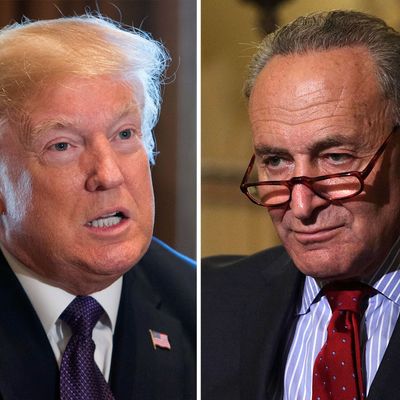
One month ago, in a city where it is legal to openly carry semiautomatic assault rifles, an American-born psychopath armed with such firearms murdered 58 people and wounded 489. One day ago, in a city where assault weapons are illegal — and restrictions on handguns draconian — an Uzbek American psychopath murdered eight people and injured 11 with a Home Depot truck, paintball rifle, and pellet gun.
One rational policy lesson you could draw from these events is that gun restrictions help mitigate the lethality of mass murderers. Alas, the irrational lesson that our president has chosen to draw from the killings is that nonwhite immigrants pose a unique threat to the American homeland. And so, on Wednesday morning, Donald Trump chose to level a bitter diatribe against one of New York’s senators.
A few pieces of this rant are truthful: Chuck Schumer was instrumental in passing one iteration of the green-card lottery program, which provides visas to 50,000 immigrants annually from parts of the world with relatively low immigration rates over the preceding five years. Immigrants from such countries must have a high-school degree or two years of work experience and no criminal record. Beyond that, they’re selected randomly. Trump also appears to be correct that the alleged perpetrator of Tuesday’s attack immigrated to the United States through the program, at least, if ABC7’s reporting holds up.
But the lottery system is in no way a specifically “Democrat” one: The program was passed with bipartisan support and signed into law by George H.W. Bush. Further, Chuck Schumer himself has actually called for the program to be ended. In 2013, Schumer announced that the program would be eliminated as part of comprehensive immigration reform; the lottery had strayed from its original purpose, the senator said, and thus “we decided we couldn’t continue it.”
What’s more, the lottery system’s initial intention wasn’t really to increase diversity in the current, partisan understanding of that term. The first green-card lottery program was authored by Massachusetts congressman Brian J. Donnelly, as a means of making the incoming pool of immigrants a bit less Mexican, Indian or Chinese — and a lot more Irish. As Amber Jameison recently wrote for The Guardian:
The 1965 Immigration Act had put the focus of immigration policy on skilled workers and family sponsorship visas, meaning green cards were mainly being allocated to just a handful of countries – Mexico, India, China and the Philippines.
Donnelly represented thousands of undocumented Irish immigrants living in Boston after a resurgence in Irish immigration in the late 1980s.
In the past, US immigration policy had discriminated against people from Asia; now, those from western Europe and Africa had limited immigration options, explained Donnelly.
“It’s just a matter of fairness. No one area of the world should have access to the American dream at the expense of others,” said Donnelly, who served as a Democratic US congressman from 1979 to 1993.
“A lottery would be the fairest way, no favoritism. We literally couldn’t think of a fairer way to do it,” said Donnelly.
A 2007 report from the Government Accountability Office found that diversity immigrants did not pose a unique threat of terrorism, but did document evidence that the program was vulnerable to fraud.
As Republican senator Jeff Flake noted Wednesday, had the Senate passed comprehensive immigration reform under President Obama, the lottery program would no longer exist.
Schumer responded to Trump’s comments by reiterating his support for immigration, scolding the president for “politicizing” the tragedy, and, then, politicizing the tragedy.
“I have always believed and continue to believe that immigration is good for America,” the senator wrote in a statement. “President Trump, instead of politicizing and dividing America, which he always seems to do at times of national tragedy, should be focusing on the real solution — anti-terrorism funding — which he proposed cutting in his most recent budget.”
Attacking politicians for “politicizing” an act of mass killing is, typically, an incoherent, bad-faith move. One of the government’s jobs is to maintain a monopoly on violence and preserve public safety. When it fails to do those things, the question of how such failures can be prevented in the future inevitably arises. And there is no apolitical way to answer that question.
Still, it is reasonable to expect the president not to respond to a terrorist attack in New York City by savaging one of the state’s senators on Twitter for supporting a policy that said senator has tried to abolish.






























